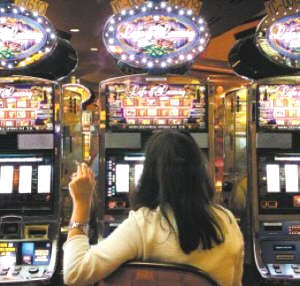Isabella County at Nearly 25 Percent Poverty Despite Casino Bucks Bonanza
|
||||||||||||||
| Printer Friendly Story View |

Median household income in Isabella, at $34,946, is sixth in the region, with only Arenac ($32,805) and Clare ($34,602) lower.
Do casinos bring economic prosperity?
Apparently not, according to figures from eight counties of the East Central Region of the Michigan State Housing Development Agency (MSHDA).
Latest MSHDA statistics, shared recently with local agencies and legislators at a luncheon, show some startling contradictions:
Isabella, home to the Saginaw Chippewa Tribe's Soaring Eagle Casino, has the highest poverty rate by far, 24.9 percent among the eight counties: Arenac, Bay, Clare, Gladwin, Gratiot, Isabella, Midland and Saginaw.
Median household income in Isabella, at $34,946, is sixth in the region, with only Arenac ($32,805) and Clare ($34,602) lower.
Other median household income figures from a U.S. Census survey in 2008 are: Bay, $45,913; Gladwin, $35,535; Gratiot $42,193; Midland $49,239; and Saginaw $41,441.
Other poverty statistics in the region are as follows:
Bay, 11.4 percent;
Clare, 18.6 percent;
Gladwin, 18.6 percent;
Gratiot, 16 percent;
Midland, 12.3 percent; and
Saginaw, 17.6 percent.
That poverty rate in Isabella is despite the estimated nearly billion dollars a year taken in by the casino. A major share of the money is distributed to about 2,700 tribal members in payments said to be about $7,000 to $10,000 per month.
While the tribe does not release payment or income data, it does distribute two percent of revenues to local governments and school districts. That program is widely popular and is one of the tribe's key public relations efforts.
However, Isabella is the only one of the eight counties to show a positive population growth rate, listed at an increase of 5.4 percent. That county was third in unemployment in the state at 8.5 percent while Midland was seventh at 10.1 percent. Clare and Gladwin were 69th and 67, respectively, at more than 16 percent each.
Bay and Saginaw are listed with the highest numbers of homeless persons, at 1,431 and 1,701 respectively. Other homeless numbers are Arenac, 96; Clare, 206; Gladwin, 100; Gratiot, 52; Isabella, 278; and Midland, 379.
Other unemployment figures, from the Michigan Department of Labor and Economic Growth in August 2009 were:
Arenac - 15.7 percent, state rank 62;
Bay - 12.1 percent, 23rd;
Gratiot - 14.2 percent, rank 50; and
Saginaw - 13.0 percent, rank 35th.
Area law enforcement officials have expressed concern privately that numerous suicides have been rumored on the federal reservation, some in the casino parking lot. Since tribal police are in charge, public reporting of such alleged incidents is up to them.
In Arenac, tribal police and the Arenac County Sheriff's Department have been haggling over jurisdiction and cooperative agreements for some time. The Saganing Casino opened in January 2007.
Arenac County, where the satellite Eagle's Landing Casino is located at Saganing, has an 18.6 percent poverty rate.
"Studies are needed to determine if the casinos are contributing to the poverty rate by impoverishing already poor local people who spend their cash trying to strike it rich," one local leader said privately.
Contracts with Native American casinos in Michigan are reportedly up for renegotiation next year and some observers are pushing for a substantial increase in the 12 percent state share of gambling revenue.
The social costs of casinos are said to be at least $2 in government costs for every dollar taken in by the gambling establishments.
"Michigan's lagging economy cannot afford to pay added social costs of casinos and not receive an adequate compensation from the gamblers," another source said. "If people want to gamble, that's fine, but not if it costs more in taxes than the casinos pay to the state."
Owing to the widespread expansion of casinos, the cost of pathological and problem gambling has soared to nearly half the annual cost of drug abuse in the United States, an expert at the University of Illinois at Urbana-Champaign says in a new book.
The social costs of gambling, such as increased crime, lost work time, bankruptcies and financial hardships faced by the families of gambling addicts, have reached epidemic proportions, costing the economy as much as $54 billion annually, Earl L. Grinols, an Illinois economist, has written in "Gambling in America: Costs and Benefits," published recently by Cambridge University Press.
This compares with the estimated annual $110 billion cost of drug abuse, according to the U.S. General Accounting Office.
Casino gambling causes up to $289 in social costs for every $46 of economic benefit, according to Grinols. "In 2003 dollars, the cost to society of an additional pathological gambler is $10,330 based on studies performed in the mid-1990s, whereas the cost to society of an additional problem gambler is $2,945," he wrote. "Accounting for the cost of raising tax dollars to cover some of these costs raises the totals to $11,304 and $3,222, respectively."
Put differently, Grinols said, "The costs of problem and pathological gambling are comparable to the value of the lost output of an additional recession in the economy every four years."
A former senior economic adviser to President Ronald Reagan, Grinols wrote the book because there is "a great unfulfilled need for an economist to study the costs and benefits of casinos in society and to identify which side of the ledger [is] predominant."
He pointed out that nearly all research on gambling consists of industry-sponsored studies ballyhooing new jobs and increased taxes.
On the positive side of the ledger, a casino may increase local employment and raise state and local tax revenues. In Las Vegas and Atlantic City, N.J., where casinos primarily serve tourists, gambling creates regional jobs and an inflow of revenues.
However, in the Midwest and South, where casinos primarily attract a local clientèle, gambling causes a net loss to the community. Not only do out-of-state casino operators remove gambling dollars from the local economy, but local employers and taxpayers must foot the bill of increased crime, personal bankruptcy, domestic violence, lost workdays, child abuse and other social costs from problem gamblers.
According to evidence cited by Grinols, gambling causes addictive and destructive behavior much like alcohol and drugs. About 30 percent of the population does not gamble, and most people who gamble do so infrequently, such as on an occasional trip to Las Vegas. However, about 10 percent of the population gambles regularly and accounts for up to 80 percent of the wagers in casino enterprises.
This means that the gaming industry's profits are based on a relatively small number of addicted gamblers who run up huge costs to themselves, their families and society. While excessive gambling affects members of all social classes, its greatest social concern comes from its prevalence among poor economic groups.
Compulsive gamblers account for more than half of casino income, Grinols has testified before the U.S. House of Representatives Judiciary Committee.
"As access to money becomes more limited, gamblers often resort to crime in order to pay debts, appease bookies, maintain appearances, and garner more money to gamble,? states the National Gambling Impact Study Commission.
Twenty percent of compulsive gamblers attempt suicide, according to the National Council on Problem Gambling, Inc., "The Need for a National Policy on Problem and Pathological Gambling in America."
"If there were no social costs caused by gambling, there would be no reason to object to it," the Illinois economist argued. "That is, when individuals understand risk and odds and want to gamble for enjoyment as they would for any other form of recreation, there is no argument."
However activities that create more social harm than good, according to Grinols, "need to be regulated, monitored and in some cases altered or banned to achieve greater social well-being. The need for public intervention occurs precisely when the costs are borne by one agent or group and the benefits by another."
Grinols has been on the Illinois faculty since 1984. He was a senior economist for the Council of Economic Advisers to President Reagan in 1987-88. He has testified before Congress and nearly two dozen state legislatures and legislative committees on the economics of gambling.
(EDITOR'S NOTE: Persons with knowledge of problem gambling are urged to contact the author of this article by e-mail at Carraroe@aol.com Names will be kept confidential.) ###
| Printer Friendly Story View |

|
Prior Article
March 5, 2025 by: Stephen Kent St. Patricks Parade 2025 - IT's TIME |

|
Next Article
February 10, 2020 by: Rachel Reh Family Winter Fun Fest is BACC Hot Spot for 2/10/2020 |
|
|

Dave Rogers |
|
|
|
Printer-Friendly Story View
0200 Nd: 06-30-2025 d 4 cpr 0
12/31/2020 P3v3-0200-Ad.cfm
SPONSORED LINKS
12/31/2020 drop ads P3v3-0200-Ad.cfm
